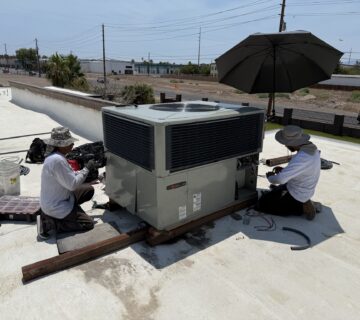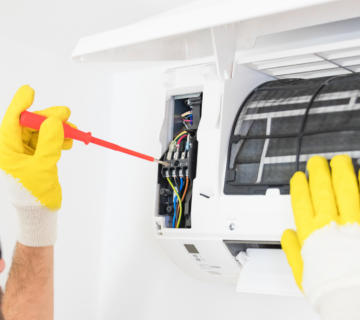An air conditioner unit with freezing pipes doesn’t necessarily mean the cold air is getting into the house. Several different culprits may be causing the freeze-up and inability to move cooled air into the home where it belongs. Find out more about how your AC system works and how to troubleshoot this common issue.
How Does an Air Conditioner Make Cold Air?
It’s helpful to know the general operating principles of an air conditioning unit, so you know the functions of the various components. Air conditioning works by taking the heat out of your house and sending it outdoors. The system has four major components: the evaporator coil, compressor, condenser coil, and refrigerant. There are three steps in operation:
- Warm air from the return vent is filtered and blown over the evaporator coil. Extremely cold refrigerant absorbs the heat and turns from liquid to gas. Cool air is circulated back into the home.
- The refrigerant is sent outside to the compressor, which compresses it and increases its temperature.
- The third step is where the condenser sends the hot air outdoors. The coolant returns to liquid during this step and circulates back in this closed-loop system.
What Are the Main Causes of Frozen AC?
Easy to fix or complex causes can be the reason for your AC freezing over. Frost can accumulate and create thick layers of ice on the coils. It may be as simple as too many closed vents or cool summer nights, but AC coils freezing up could also be a symptom of a more significant mechanical issue. Below are possible causes to consider when you have ice on your air conditioner. Frozen condensation may form on indoor or outdoor components.
Low Refrigerant
Refrigerant, the cold liquid that cools the air before it enters your home, can’t work if its level is too low and it isn’t circulating properly. The compressor outdoors uses coolant to move cool air into the house. Since refrigerant doesn’t evaporate as it circulates, a low level typically can be traced to a leak in the refrigerant lines, compressor, or evaporator coil. Suspected refrigerant level issues need to be checked by a professional.
Poor Air Circulation
Proper performance requires good airflow. Several culprits can lead to inefficient operation and the AC unit freezing up.
- Blower motor. This fan blows air through the coils and can freeze up, causing your blower to make a rattling noise.
- Electrical issues. Insufficient power to the blower motor can lead to poor performance and freezing issues.
- Circulation issues. Bad air filters, duct leaks, and blockages impede airflow from the AC unit throughout the house, leading to an increased chance of the unit freezing up.
- Blocked coils. Dust accumulates easily due to the moisture on the evaporator coils, insulating them and encouraging ice formation.
How Do I Unfreeze a Frozen AC Unit?
You can take a few troubleshooting steps to help you uncover potential issues and serve as a reminder to conduct regular maintenance. The tips for unfreezing an AC unit also can help you perform regular inspections and keep your AC in top condition.
Air Filter
The first step is to make sure the air filter allows the system to perform properly. This is typically a quick fix for a frozen AC unit. Dirty or clogged filters impede airflow and can cause ice buildup and cause poor performance, along with inefficient operation. Air filters should be replaced about once every three months to maximize performance.
Refrigerant Leaks
Detecting and fixing leaks requires an HVAC professional’s specialized knowledge and tools. Contact a professional if you suspect coolant leaks.
Blower Fan
Look for damage or broken fan components or unusual noises while operating. Issues can lead to the system freezing up or performing poorly. Detailed inspections require an HVAC professional and include checking the motor’s condition, the rotation speed of the fan, and the power.
Vents
Unimpeded air circulation in the supply and return vents is key to a properly operating system. Furniture, other obstructions, and more than two or three supply vents being closed can cause the AC unit to freeze up due to too much restriction.
Drain Lines
When the AC unit removes humidity, it has to go somewhere. Check the drain line and drip tray for any signs of blockage that could lead to the evaporator coil freezing up. Some issues may be fixed easily, while others require an HVAC professional.
Will a Frozen AC Unit Fix Itself?
Usually the answer is no, but… Once you’ve performed checks for blockages and other potential issues, the next step is to defrost the unit by shutting it off. The thawing process can take one to three hours. After the system is thawed, operate the fan only for about an hour and change your air filter. Once thawed, the AC unit should be ready for regular operation. Observe it for additional issues that may pop up as the unit operates. Ensure it’s not running when outdoor temperatures drop below 60 degrees.
What Do I Do If My AC Keeps Freezing?
Circumstances beyond mechanical issues or airflow blockages can lead to an AC unit freezing. Freezing issues can be avoided or limited by taking a few steps and being mindful of how the system handles temperature extremes. Cool weather can interfere with an AC unit’s operation since it’s calibrated to perform best in a specific temperature range. It’s best to turn off the AC if there are 60 degrees and below outdoor temperatures.
If you suspect mechanical issues like a bad blower fan motor or coolant leaks, it’s best to shut off the AC unit to prevent further damage and contact an HVAC professional to check it out.
Maintenance Is Key for Preventing Your AC from Freezing
Many of the causes of a freezing AC unit can be traced back to maintenance issues like clogged vents, bad filters, and clogged drainage lines. While homeowners can make regular maintenance and visual check steps, mechanical issues, coolant leaks, and troubleshooting complex issues should be done by a trained HVAC professional. The steps to troubleshoot frozen AC units can help you watch for potential issues before they lead to performance problems or damage. Even with regular AC tune-ups and inspections by professionals, systems are susceptible to mechanical issues since they are subject to extreme weather conditions and strenuous operating conditions.
For more information on air conditioner maintenance or to schedule a free consultation, give the team at LEGACY a call at 725-237-2441. You can also reach us via our convenient and secure contact form. Our experts can service or fix a variety of AC unit issues. Give us a call to get started today.




